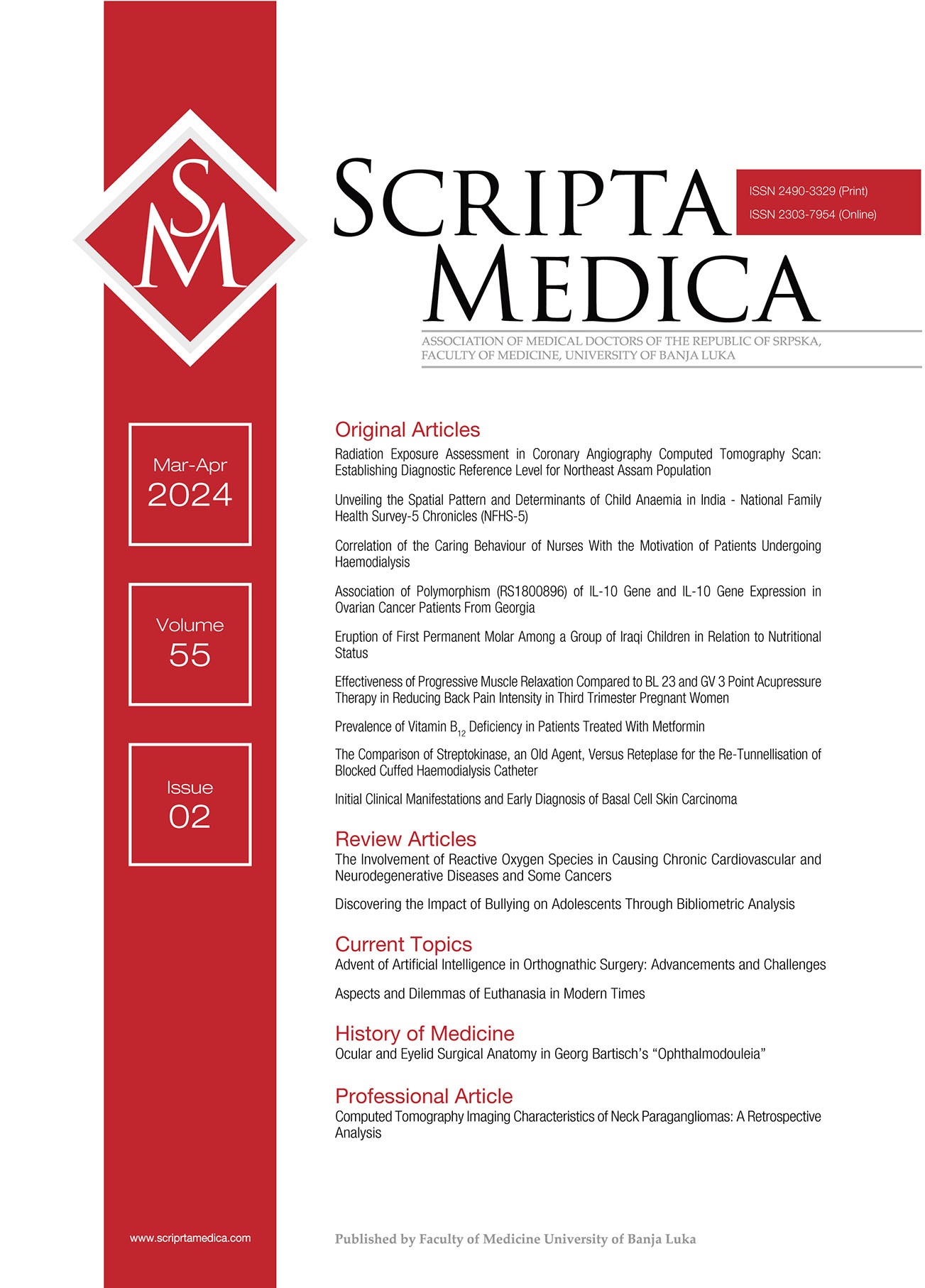Association of Polymorphism (RS1800896) of IL-10 Gene and IL-10 Gene Expression in Ovarian Cancer Patients From Georgia
Abstract
Background/Aim: Ovarian cancer is one of the most important causes of tumour-associated mortality and morbidity in women. Some genetic alterations, determining predisposition to ovarian cancer have already been identified, but these are mostly syndrome-associated cases, most ovarian tumours are still regarded as sporadic. The aim of this research was to identify new predisposing factors that might increase ovarian cancer risk. Genetic variants of IL-10 gene in patients with ovarian cancer was analysed.
Methods: Forty-eight patients with ovarian cancer along with 48 age-matched controls were included in the study. Single nucleotide polymorphism (SNP) genotyping and gene expression assays for IL-10 were performed using TaqMan assay (Thermo Scientific, USA). The selected SNP was rs1800896 upstream of IL-10 gene (IL-10-1082). All statistical analyses were performed by GraphPad Prism 9.3.1 for Mac.
Results: The genotype distributions of IL-10 gene polymorphisms among cancer and control groups were all according to the expected Hardy–Weinberg equilibrium. There was no statistically significant difference in frequency of genotypes and alleles between the two study groups (p > 0.05). In another analysis, the samples were grouped according to the polymorphic variant IL-10 (− 1082) A/G. Subjects having the homozygous variant (A/A) had lower IL-10 mRNA levels than those with the homozygous wild (G/G) genotype in both, ovarian cancer patients and controls, p < 0.05. mRNA levels on IL-10 were different among cases and controls (p < 0.05). Patients with ovarian cancer had higher level of mRNA for IL-10.
Conclusions: These results support the theory that IL-10 gene expression levels differ in patients with and without ovarian cancer. Polymorphic variant IL-10 (− 1082) A/G couldn’t be confirmed to explain this difference in gene expression levels.
References
Huang J, Chan WC, Ngai CH, Lok V, Zhang L, Lucero-Prisno DE 3rd, et al. On behalf of NCD Global Health Research Group of Association of Pacific Rim Universities Apru. Worldwide burden, risk factors, and temporal trends of ovarian cancer: a global study. Cancers (Basel). 2022 Apr 29;14(9):2230. doi: 10.3390/cancers14092230.
Ovarian cancer statistics: World cancer research fund international (2022) WCRF International. [Internet]. [Accessed: 22-Feb-2023]. Available at: https://www.wcrf.org/cancer-trends/ovarian-cancer-statistics/.
Guo T, Dong X, Xie S, Zhang L, Zeng P, Zhang L. Cellular mechanism of gene mutations and potential therapeutic targets in ovarian cancer. Cancer Manag Res. 2021 Apr 8;13:3081-100. doi: 10.2147/CMAR.S292992.
Surmava S, Kvaratskhelia E, Balakrishnan P, Shah J, Abzianidze E, Tavartkiladze AA, et al. Single nucleotide polymorphisms in the folate metabolic pathway genes and global DNA methylation in ovarian cancer. ESMO Open. 2023; 8(5):101881. doi: 10.1016/j.esmoop.2023.102201.
Ning F, Cole CB, Annunziata CM. Driving immune responses in the ovarian tumor microenvironment. Front Oncol. 2021 Jan 15;10:604084. doi: 10.3389/fonc.2020.604084.
Yigit R, Massuger LF, Figdor CG, Torensma R. Ovarian cancer creates a suppressive microenvironment to escape immune elimination. Gynecol Oncol. 2010 May;117(2):366-72. doi: 10.1016/j.ygyno.2010.01.019.
Mannino MH, Zhu Z, Xiao H, Bai Q, Wakefield MR, Fang Y. The paradoxical role of IL-10 in immunity and cancer. Cancer Lett. 2015 Oct 28;367(2):103-7. doi: 10.1016/j.canlet.2015.07.009.
Mustea A, Könsgen D, Braicu EI, Pirvulescu C, Sun P, Sofroni D, Lichtenegger W, Sehouli J. Expression of IL-10 in patients with ovarian carcinoma. Anticancer Res. 2006 Mar-Apr;26(2C):1715-8. PMID: 16617566.
Pisa P, Halapi E, Pisa EK, Gerdin E, Hising C, Bucht A, et al. Selective expression of interleukin 10, interferon gamma, and granulocyte-macrophage colony-stimulating factor in ovarian cancer biopsies. Proc Natl Acad Sci U S A. 1992 Aug 15;89(16):7708-12. doi: 10.1073/pnas.89.16.7708.
Zhao S, Wu D, Wu P, Wang Z, Huang J. Serum IL-10 predicts worse outcome in cancer patients: a meta-analysis. PLoS One. 2015 Oct 6;10(10):e0139598. doi: 10.1371/journal.pone.0139598.
Lane D, Matte I, Garde-Granger P, Bessette P, Piché A. Ascites IL-10 promotes ovarian cancer cell migration. Cancer Microenviron. 2018 Dec;11(2-3):115-24. doi: 10.1007/s12307-018-0215-3.
Ioana Braicu E, Mustea A, Toliat MR, Pirvulescu C, Könsgen D, Sun P, et al. Polymorphism of IL-1alpha, IL-1beta and IL-10 in patients with advanced ovarian cancer: results of a prospective study with 147 patients. Gynecol Oncol. 2007 Mar;104(3):680-5. doi: 10.1016/j.ygyno.2006.10.014.
Ford CE, Werner B, Hacker NF, Warton K. The untapped potential of ascites in ovarian cancer research and treatment. Br J Cancer. 2020 Jul;123(1):9-16. doi: 10.1038/s41416-020-0875-x.
Naing A, Infante JR, Papadopoulos KP, Chan IH, Shen C, Ratti NP, et al. PEGylated IL-10 (Pegilodecakin) induces systemic immune activation, CD8+ t cell invigoration and polyclonal T cell expansion in cancer patients. Cancer Cell. 2018 Nov 12;34(5):775-791.e3. doi: 10.1016/j.ccell.2018.10.007.
Rallis KS, Corrigan AE, Dadah H, George AM, Keshwara SM, Sideris M, et al. Cytokine-based cancer immunotherapy: challenges and opportunities for IL-10. Anticancer Res. 2021 Jul;41(7):3247-52. doi: 10.21873/anticanres.15110.
Zhu Z, Liu JB, Liu X, Qian L. Association of interleukin 10 rs1800896 polymorphism with susceptibility to breast cancer: a meta-analysis. J Int Med Res. 2020 Apr;48(4):300060520904863. doi: 10.1177/0300060520904863.
Miteva LD, Stanilov NS, Deliysky TS, Stanilova SA. Significance of -1082A/G polymorphism of IL10 gene for progression of colorectal cancer and IL-10 expression. Tumour Biol. 2014 Dec;35(12):12655-64. doi: 10.1007/s13277-014-2589-2.
Ahmadi S, Surmava S, Kvaratskhelia E, Abzianidze E, Kankava K. IL-10 polymorphism and breast cancer risk in Georgian women: a case-control study. Glob Med Genet. 2023 Jul 10;10(3):159-63. doi: 10.1055/s-0043-1770957.
- Authors retain copyright and grant the journal right of first publication with the work simultaneously licensed under a Creative Commons Attribution License that allows others to share the work with an acknowledgement of the work's authorship and initial publication in this journal.
- Authors are able to enter into separate, additional contractual arrangements for the non-exclusive distribution of the journal's published version of the work (e.g., post it to an institutional repository or publish it in a book), with an acknowledgement of its initial publication in this journal.
- Authors are permitted and encouraged to post their work online (e.g., in institutional repositories or on their website) prior to and during the submission process, as it can lead to productive exchanges, as well as earlier and greater citation of published work (See The Effect of Open Access).

